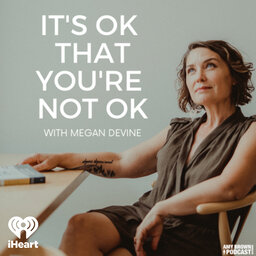Real Self-Care with Dr. Pooja Lakshmin
Have you ever put on a face mask, expecting it to solve all your mental health problems?
That seems… unrealistic, but that’s what self-care marketing tells us: get your self care right, and all your difficulties will evaporate.
This week, Dr. Pooja Lakshmin breaks down what “self-care” actually means when we’re living in a complex, capitalistic world. It’s an exploration of grief, burnout, and exhaustion, and what it takes to care for yourself inside systems that repeatedly ignore their part in your suffering.
After leaving med school to join a wellness group that turned out more cult-like than liberating, Dr. Lakshmin went on a journey to heal herself. Along the way, she founded Gemma, a women’s mental health organization, and wrote a book called Real Self-Care: A Transformative Program for Redefining Wellness (warning: crystals, cleanses, and bubble baths not included).
In this episode we cover:
- Why self-care doesn’t work
- Does looking for your own answers mean you have to do things alone?
- Accepting help as a bid for connection
- How Dr. Lakshmin’s definition of boundaries can help you practice real self-care
- The difference between eudaimonic and hedonic well-being
- How hope is different than optimism
Related episodes:
For more on systems that fail us and what to do about it: Rage Becomes Her (and by “her” I mean US) with Soraya Chemaly
A fantastic discussion of the “wellness movement” and what it means for chronically ill folks: Living with Chronic Illness: A Conversation for Everyone with a Body with Sarah Ramey.
Notable quotes:
“Hope is different than optimism… Hope is something you can build. It’s a practice. It’s a skill.” - Dr. Pooja Lakshmin
About our guest:
Dr. Pooja Lakshmin MD is a psychiatrist, a clinical assistant professor at George Washington University School of Medicine, and the founder and CEO of Gemma, the women’s mental health community centering impact and equity. She has spent thousands of hours taking care of women struggling with burnout, despair, depression, and anxiety in her clinical practice. Her debut non-fiction book, Real Self-Care: A Transformative Program for Redefining Wellness (Crystals, Cleanses, and Bubble Baths Not Included), is out now and available in e-book, hardcover, and audiobook narrated by Pooja.
About Megan:
Psychotherapist and bestselling author Megan Devine is recognized as one of today’s most insightful and original voices on grief, from life-altering losses to the everyday grief that we don’t call grief. She helms a consulting practice in Los Angeles and serves as an organizational consultant for the healthcare and human resources industries.
The best-selling book on grief in over a decade, Megan’s It’s Ok that You’re Not OK, is a global phenomenon that has been translated into more than 25 languages. Her celebrated animations and explainers have garnered over 75 million views and are used in training programs around the world.
Additional resources:
More from Pooja Lakshmin:
Gemma Women’s Mental Health Community
“Hope is Not a Thing to Have – It’s a Skill to Practice” Oprah Daily
“How Society Has Turned Its Back on Mothers” NY Times
“Saying ‘No’ Is Self-Care for Parents” NY Times
Want to talk with Megan directly? Join our patreon community for live monthly Q&A sessions: your questions, answered. Want to speak to her privately? Apply for a 1:1 grief consultation here.
Check out Megan’s best-selling books - It’s OK That You're Not OK and How to Carry What Can’t Be Fixed
Books and resources may contain affiliate links.
Get in touch:
Thanks for listening to this week’s episode of It’s OK that You’re Not OK. Tune in, subscribe, leave a review, tag us on social with your thoughts, and share the show with everyone you know. Together, we can make things better, even when they can’t be made right.
Follow the show on TikTok @itsokpod and use the hashtag #ItsOkPod on all social platforms
For grief support & education, follow us at @refugeingrief on Instagram, Facebook, Twitter, and TikTok, and follow Megan on LinkedIn
For more information, including clinical training and consulting and to share your thoughts, visit us at megandevine.co
 It’s OK That You’re Not OK with Megan Devine
It’s OK That You’re Not OK with Megan Devine


